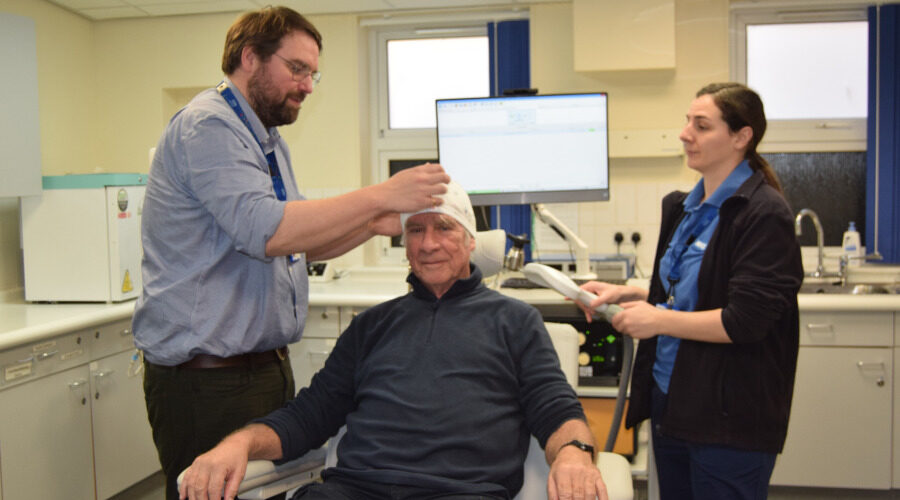
Spotlight
Treatment for severe depression now available on the NHS in Somerset
Somerset has become the first county in the south west to offer a groundbreaking treatment for severe depression, free on the NHS.
A team of mental health clinicians have set up an NHS clinic in Taunton for the widely acclaimed repetitive Transcranial Magnetic Stimulation treatment – also known as rTMS.
The treatment is used for people with depression that haven't responded well to other medical treatment, such as antidepressants. It has very minimal side effects too.
Dr Nathan Maynard, our lead consultant psychiatrist for the rTMS clinic, explains:
“Depression can be a very debilitating illness and is a leading cause of disability worldwide, with up to a third of patients being resistant to clinical treatments, so any new treatment we have for it is really welcome.
“We are one of a few NHS clinics in the whole of the UK that offer rTMS, which has been approved by the National Institute for Clinical Effectiveness and the Royal College of Psychiatrists for several years.
“We typically see patients who are under the care of our mental health services and who regularly see a care coordinator.
“If first line treatments, such as antidepressants and talking therapies, are not effective, then they can be considered for rTMS if it’s clinically appropriate for them.
“The patient would be referred to our clinic and I’d assess them, before offering an intensive course of rTMS.
The rTMS treatment is non-invasive brain stimulation that essentially uses a strong magnetic field which changes direction and can stimulate or inhibit different parts of the brain, depending on where the coil is placed and the frequency of change in the magnetic field.
“We know that certain parts of the brain are underactive in depression, so this treatment promotes regeneration of those areas,” continues Nathan. “It feels like a tapping sensation on a patient's skull, and there are minimal side effects. It's great to be able to offer patients more of a choice.”
Catriona Gullick, our neuromodulation team leader, explains how the rTMS treatment works. “Patients are invited to an initial consultation at the clinic so they can meet our team and get an understanding of what the commitment to treatment might be, such as what it’s like to travel here,” she said. “This first step is really important as it’s quite a commitment to do this for five days a week, for six weeks.
“Once a patient comes in, we’d take some initial measurements which would enable us to fit a treatment cap for them to wear during treatment sessions, and also find their motor threshold. This appointment gives them an experience of the machine as well, so they can hear how loud it is, experience the tapping sensation, and generally understand what to expect from the next six weeks.
“The clinic runs in the afternoon, so we try to arrange a time that suits the patient, which we try to stick to throughout their treatment. Each session takes about an hour – taking some physical observations (such as blood pressure and pulse) and then having treatment, which is roughly a 40-minute programme on the machine, followed by us taking their physical observations again.
“During treatment, patients can chat to our colleagues, read, or listen to music, whichever they would prefer to do during their sessions.
“We review the patient’s progress throughout their treatment and chat with them about how things are going.
“Most of our patients are under the care of our mental health services so they’ll generally have a community consultant or key worker. We work closely with our mental health colleagues to identify any changes in the patient’s condition that might inform their treatment.
“Feedback from patients has been really positive so far and we’re looking forward to offering the service more widely.”
David from Frome was one of the most recent patients to undergo the rTMS treatment at our Wellsprings Clinic.
He started suffering from depression and anxiety about five years ago due to a number of personal circumstances, and it meant he needed to stop work.
“Over the years I’ve tried various combinations of anti-depressants, some of which gave me bad side effects, and others just didn’t work for me at all,” he said.
“I ended up on Mirtazapine and Lithium and found that this combination of drugs stabilised me quite a lot, but I was still left with severe anxiety, particularly in the mornings.
“I did a little research myself and found that the rTMS treatment was available across the country privately, but not on the NHS. I mentioned it to my psychiatrist, who got in touch with the clinic in Taunton and arranged for me to come for a series of appointments.
“Although it’s a fair drive from where I live in Frome, I came down to Taunton for six weeks and I’ve found the treatment to be very beneficial. It has helped a lot with the severity of my anxiety and depression.
“I also haven’t had any side effects from the treatment, other than a slightly sore head for an hour or two – which was great.
“I found the team in Taunton to be fantastic and it’s generally a very welcoming environment and so personal. I didn’t feel as though I was in a large hospital setting – it was a really nice haven of calm.
“Now that I’ve finished my course of treatment, I keep in touch with the clinic team and let them know of my progress, as they were such a help to me.”

